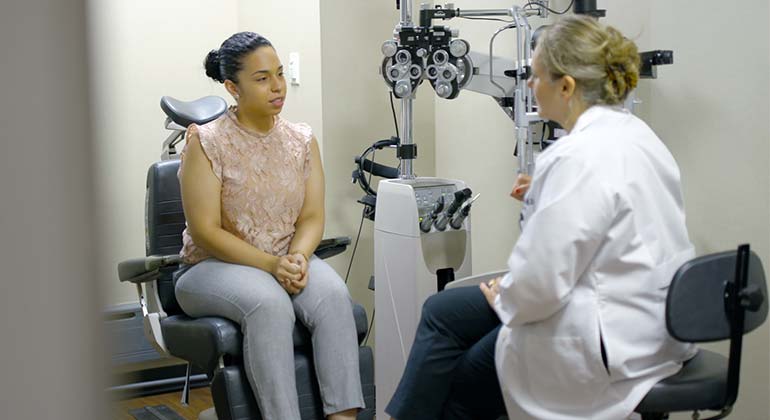Professional Neurologist Andalusia: Comprehensive Brain Health Services
Professional Neurologist Andalusia: Comprehensive Brain Health Services
Blog Article
Is Refractive Surgical Procedure Right for You? Elements to Take Into Consideration for Better Eyecare
In the world of eye treatment, the decision to go through refractive surgical treatment is a substantial one that requires thoughtful factor to consider. From the intricacies of one's ocular health to the intricacies of everyday routines and personal expectations, each aspect holds importance in the broader landscape of refractive surgery candidacy.
Eye Health Evaluation
When considering refractive surgery, a thorough eye wellness examination is important to analyze the viability of the procedure for each and every individual. eye center andalusia. This examination involves a collection of evaluations and examinations carried out by an eye care specialist to figure out the general health of the eyes, the visibility of any type of underlying problems, and the stability of the refractive error
During the analysis, different factors are taken into consideration, such as the client's clinical history, existing eye prescription, corneal thickness, student size, and tear movie high quality. These analyses assist to identify any kind of contraindications to refractive surgery, such as corneal problems, cataracts, or untreated eye infections. In addition, the examination aids to take care of individual assumptions concerning the potential end results of the surgical treatment based upon their special eye characteristics.
Inevitably, the eye health examination is crucial in making sure the safety and security and performance of refractive surgery, as it supplies beneficial understandings into the individual's eye health status and assists establish the most suitable treatment options for accomplishing ideal visual results. (neurologist andalusia)
Lifestyle Assessment
A thorough way of living evaluation is integral in figuring out the suitability of refractive surgical procedure for an individual's aesthetic adjustment needs. Way of life factors such as profession, hobbies, and everyday tasks play a vital duty in the decision-making process pertaining to refractive surgery.
Moreover, way of living behaviors such as sporting activities engagement, outside activities, or even skincare regimens can affect the healing process and overall success of refractive surgery. By performing a comprehensive way of living assessment, eye care professionals can customize their referrals and treatment plans to fulfill the one-of-a-kind requirements of each individual, eventually leading to improved aesthetic results and fulfillment.
Expectation Placement

Establishing realistic expectations entails comprehensive pre-operative discussions between the individual and the eye doctor. The surgeon ought to transparently communicate the possible threats, advantages, and restrictions of the procedure (neurologist andalusia). People need to understand that while several individuals accomplish 20/20 vision or better adhering to refractive surgical treatment, some may still call for glasses for sure activities like analysis or driving at night. Taking care of these expectations helps stop disappointment and frustration post-surgery, leading to a more favorable total experience for the individual.
Danger Evaluation

Aspects that may boost the risk of issues consist of age, specific clinical problems like autoimmune conditions, unsteady vision prescription, slim corneas, and unrealistic individual assumptions. Furthermore, picking a competent and experienced specialist, adhering to pre and post-operative care directions faithfully, and disclosing any type of appropriate case history can aid alleviate threats.
To minimize the probability of issues, ophthalmologists carry out thorough pre-operative assessments to recognize any contraindications to surgical procedure. They also go over the potential risks and benefits with individuals throughout the consultation process. By taking part in open communication and shared decision-making, both the eye doctor and the person can interact to determine if refractive surgery is the ideal selection based upon individual risk profiles and preferred end results.
Appointment Importance
Considering the crucial role of informed decision-making in analyzing threats and prospective complications in refractive surgical treatment, the examination process holds considerable importance in guiding patients in the direction of optimum end results. During the assessment, the ophthalmologist evaluates the patient's eye health, refractive mistakes, and general suitability for surgery. This first evaluation is vital in figuring out the most ideal treatment for every individual, considering aspects such as corneal thickness, student dimension, and existing eye conditions.
In addition, the examination functions as a chance for patients to discuss their assumptions, concerns, Bonuses and any type of questions they may have concerning the surgery. Clear interaction between the person and the specialist is necessary to guarantee realistic assumptions and a complete understanding of the potential dangers and benefits included.
Additionally, the examination permits the cosmetic surgeon to clarify the various medical options offered, their respective results, and the post-operative treatment required. This extensive conversation empowers patients to make educated choices concerning their eye treatment, resulting in far better contentment and outcomes post-surgery.
Final Thought
In conclusion, individuals taking into consideration refractive surgery must undertake a comprehensive eye health examination, assess their lifestyle practices, straighten their assumptions with possible outcomes, analyze the involved dangers, and prioritize appointments with eye care experts. These aspects play a crucial function in figuring out the viability of refractive surgical treatment for each and every individual, guaranteeing optimal results and complete satisfaction with the procedure.
Individuals taking into consideration refractive surgical procedure usually have high assumptions regarding the outcomes, anticipating excellent vision without the demand for glasses or call lenses. While refractive surgical procedure can considerably enhance vision and decrease dependency on visual aids, it is crucial for patients to recognize that outcomes may differ based on private elements such as the level of refractive mistake, corneal thickness, and overall eye wellness.
By involving in open communication and shared decision-making, both the patient and the eye doctor can function together to determine if refractive surgical treatment is the right selection based on private risk accounts and preferred outcomes.
Thinking about the important role of educated decision-making in examining risks and possible issues in refractive surgery, the appointment process holds significant importance in assisting clients in the direction of optimal end results. During the appointment, the ophthalmologist reviews imp source the person's eye health and wellness, refractive errors, and overall suitability for surgical procedure.
Report this page